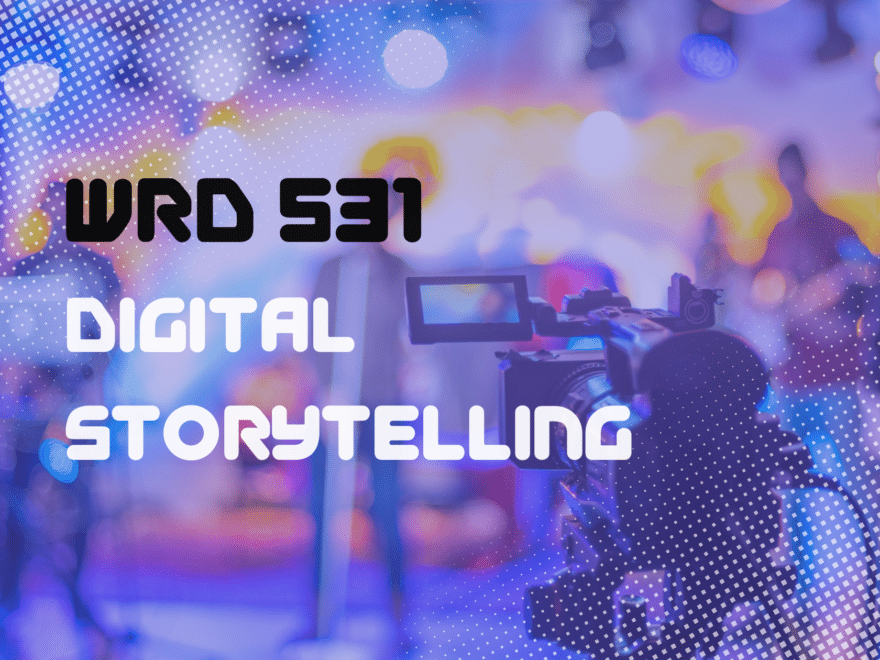This upcoming Winter Quarter, Professor Lisa Dush will be teaching another iteration of the popular graduate course WRD 531: Digital Storytelling.
In this course, students will analyze current digital storytelling practices, genres, and techniques that organizations use to share information and gain support online; then, students will create their own original digital story collections and projects. This course will engage students in new digital writing processes while applying their rhetorical awareness and creativity. WRD 531 is ideal for students in MAWRD”s Professional and Digital Writing concentration, those pursuing a SWAN certificate, and other graduate students looking to add to their professional writing repertoire!
Read on for more details about the upcoming course!
What is the main focus of WRD 531: Digital Storytelling?
This course introduces the principles and techniques used to create digital personal experience narratives (DPENs) and to circulate these narratives for organizational or community-building purposes. After exploring a prototypical DPEN genre–the digital story–students will make their own digital stories and learn about the values that inform traditional digital storytelling practice.
Often, digital stories are used by nonprofits and other organizations to tell stories and relay testimonies with the aim of garnering support (and potentially, funding). After analyzing and collecting digital stories already published by such organizations, students will explore the ethical responsibilities of such storytellers before diving into the process of creating their own meaningful digital story from start to finish.
What can students expect to learn in this course?
Students will engage in reading and hands-on projects to learn interviewing, narrative script writing, digital audio and video editing, and techniques for applying important rhetorical and ethical principles to professional writing work.
At the end of the course, students will have acquired an array of theories and techniques for constructing impactful narratives that advance the work of nonprofits, advocacy and service organizations, and other arenas that utilize this genre to compel change in their communities.
What readings and projects can students expect to complete?
WRD 531 includes readings from both academics and practitioners to create discussions based on the many theoretical and pragmatic facets of digital storytelling. Students will discuss these materials in written discussion posts and reflections throughout the course, and will work to apply their principles in researching and creating digital productions.
In addition, the following four projects offer students more hands-on experience to enhance their confidence in conceptualizing and executing meaningful, professional, and ethical digital storytelling projects:
- Original Digital Story: Using the digital storytelling method devised by StoryCenter, students will craft their own 3-4-minute digital story on a personally meaningful topic of their choice.
- Short Paper Exploring a Digital Story: Using theoretical concepts learned in the course, students will perform a close analysis of a DPEN of their choice, exploring if and why the text is a story, what work it might do, and the process priorities that should guide work with the storyteller.
- Interview-Based Story: Using interview, listening, and story-shaping skills learned in WRD 531, students will each interview one person and craft a story that either fits within an organization’s existing online spaces or serves as a prototype for content that will go in a new online space.
- Landscape Analysis and StoryBase Entries: This project asks students to conduct a ‘landscape analysis’ of DPENs in a particular sector (e.g., higher ed, health care, religious orgs) or in the service of a particular advocacy cause (e.g., immigration reform, environmental justice) and to synthesize your findings in an online post. Students will also create small collections of these DPENS in StoryBase.
Who should take this course?
Students interested in writing for public audiences can hone their creative and rhetorical skills through this course by working through the digital storytelling process from start to finish. As a key aspect of professional writing intended to compel change, digital storytelling experience is useful for aspiring professional writers of all kinds.
Enroll in WRD 531 to hone your rhetorical and production skills while writing for real audiences! To stay up to date with upcoming courses and programs, check out the WRD Blog’s Course Spotlights.
